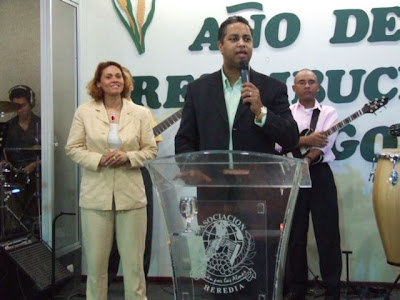Using Words of Knowledge
Here is a useful teaching I got a few years ago at a New Wine conference here in Amsterdam on using words of knowledge in ministry. I use these notes to teach on this gift and more importantly to challenge people to step out and grow in hearing God's voice supernaturally (which by the way should be quite natural).
Words of Knowledge- Insight or information not known naturally but supernaturally. One of the revelatory gifts which include words of knowledge, wisdom, prophecy and discernment.
1. JESUS’ ENCOUNTER WITH NATHANIEL – John 1:43f Ministry to believer
Philip witnesses to Nathaniel about Jesus – but Nathaniel shrugs it off – “can
anything good come out of Nazareth?” v46
a) He thought he understood scripture
b) He may have been disappointed before – maybe hurt searching for Messiah.
c) Jesus says “here is an Israelite in whom there is no guile” v47 (This is a prophetic insight – revelation – word of knowledge. Nathaniel didn’t recognise it. “How do you know me?” v48
d) Jesus says “I saw you under the fig tree before Philip called you” v48
e) Nathaniel responds – “You are the Son of God.” V49. He responded because the Holy Spirit applied it to him. We may not see this on the surface (e.g. many people sheltered under fig trees.) Don’t evaluate revelation on an “awesomeness scale”. Holy Spirit works in ways we don’t understand.
2. JESUS AND THE SAMARITAN WOMAN-John 4:7f Ministry in “the world”
Compassion and love in revelation – not callous or giving control - “You have
had five husbands….. A time is coming when you will worship the Father… “
Real hope for her – Jesus reveals truth about himself “I am He”.
3. HOW DO YOU RECEIVE WORDS OF KNOWLEDGE?
1) Pictures
2) Seeing words – in your “mind’s eye” or superimposed on the body
3) Impressions – you know that you know something – hearing names – etc plays on words.
4) Experiencing pain or emotions not your own.
5) “Automatic mouth” - Say something without thinking that is true.
4. PRACTICAL HELPS:-
1) They are often fleeting – gossamer wisps of information
2) Very accessible – anyone can minister them
3) Often start from what is familiar to you e.g. Peter’s trance Acts 10:10
4) As you act on them more will come.
5) Offer them, don’t impose them.
6) Recognise they may be wrong
7) If not appropriate, put in “pending tray” or forget.
8) Don’t worry about time lag between giving them and people responding.
9) Don’t worry how bizarre or ordinary they seem.
Extra notes from Matt
At times using a spring board can be helpful: People have said to you….or You have said… or when you were ____ years old ____________
You start with that phrase and then you say what you feel the HS leads you to say. If you were right, then you know it was the Holy Spirit. Only way to find out if a word of knowledge is from God is by stepping out and asking or saying it.
Helpful Books with good examples of using words of knowledge in ministry
Wimber, John & Kevin Springer, Power Evangelism, Harper Row: San Francisco, 1986.
Best, Gary, Naturally Supernatural: God may be closer than you think. Vineyard International:Cape Town Publishing, 2008.
Johnson, Bill and Randy Clark, Healing Unplugged. Bloomington: chosen Books, 2012.
Stibbe, Mark, Prophetic Evangelism. Authentic Media: Milton Keynes, 2004.

Comments